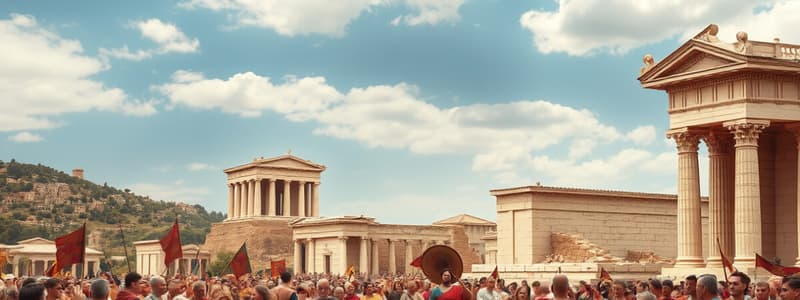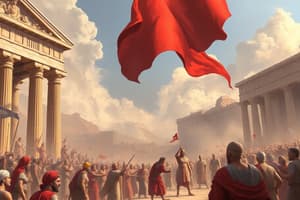Podcast
Questions and Answers
What geographical feature significantly contributed to the independence of Greek city-states?
What geographical feature significantly contributed to the independence of Greek city-states?
- Vast plains that facilitated trade
- Large lakes that provided freshwater
- Deserts that limited agricultural growth
- Mountain ranges that isolated communities (correct)
Which region is known as the site of Sparta?
Which region is known as the site of Sparta?
- Thessaly
- Peloponnesus (correct)
- Boeotia
- Attica
What event in 338 B.C. marked a significant change in Greek history?
What event in 338 B.C. marked a significant change in Greek history?
- The establishment of Athens as a major city-state
- The unification of Greek city-states under Macedonian rule (correct)
- The defeat of the Persians by Alexander
- The formation of the Delian League
How did the Greeks primarily extend their influence throughout the Mediterranean region?
How did the Greeks primarily extend their influence throughout the Mediterranean region?
Which of the following best describes the topography of Thessaly?
Which of the following best describes the topography of Thessaly?
What was a major theme emphasized by Pericles during his funeral oration?
What was a major theme emphasized by Pericles during his funeral oration?
Which aspect of Greek civilization was particularly influential on Western thought?
Which aspect of Greek civilization was particularly influential on Western thought?
What institution emerged in ancient Greece by the eighth century B.C.E.?
What institution emerged in ancient Greece by the eighth century B.C.E.?
During the Warring States Period, what context was Pericles addressing in his oration?
During the Warring States Period, what context was Pericles addressing in his oration?
Which question was NOT highlighted as part of the Greek inquiry into human existence?
Which question was NOT highlighted as part of the Greek inquiry into human existence?
Study Notes
Warring States Period and the Peloponnesian War
- The Warring States Period in China coincided with a civil war in Greece, specifically the Peloponnesian War starting in 431 B.C.E.
- Key city-states involved were Athens and Sparta, each vying for control over the Greek world.
Pericles and Athenian Democracy
- Pericles delivered a public funeral oration honoring those who had died in battle, reflecting on Athenian values.
- He emphasized the democratic system of Athens, highlighting that power rested in the hands of the entire populace, not just a minority.
- Pericles articulated the importance of both individual rights and civic responsibility, contrasting Athenian ideals with those of autocratic societies.
Greek Philosophical Inquiry
- Greeks engaged deeply with fundamental questions about existence, purpose, community, and truth.
- They developed a system of logical and analytical thought, laying the groundwork for Western civilization's understanding.
The Emergence of the Polis
- Greek civilization began around 1900 B.C.E., resulting in the rise of the polis, or city-state, by the eighth century B.C.E.
- The classical era of the fifth century B.C.E. marked the zenith of Greek culture, yet internal conflicts weakened their independent city-states.
Macedonian Conquest and Its Impact
- The internal warfare among Greek city-states made them vulnerable to external threats, particularly from Philip II of Macedonia.
- Philip’s son, Alexander, successfully led conquests that established Greek culture across the Middle East, furthering its influence despite the fall of independent city-states.
Geography's Role in Greek History
- Greece's geography is characterized by a mountainous peninsula covering around 45,000 square miles, similar in size to Louisiana.
- The mountainous terrain created isolation among Greek communities, fostering independent political and cultural development.
Political Dynamics and Rivalries
- The fierce independence of small Greek communities often led to conflicts and warfare.
- Despite fostering political participation, this rivalry ultimately contributed to societal devastation.
Influence of the Sea on Greek Civilization
- Greece’s extensive coastline and numerous harbors facilitated maritime trade and colonization.
- Greeks became adept seafarers, spreading their culture across the Aegean and Mediterranean Seas.
Regional Divisions of Greece
- Major regions included the Peloponnesus, home to Sparta, and the Attic Peninsula, where Athens was located.
- Other important areas were Boeotia, known for Thebes, and Thessaly, recognized for its agricultural output.
- Macedonia rose in prominence after the conquest of Greece in 338 B.C.E. by Philip II.
Studying That Suits You
Use AI to generate personalized quizzes and flashcards to suit your learning preferences.
Description
This quiz explores the Warring States Period in China and the Peloponnesian War in Greece, highlighting key events, figures, and the concept of Athenian democracy during this tumultuous time. It also touches upon the philosophical inquiries that shaped Western thought. Test your knowledge of these significant historical events and their impact on civilization.




